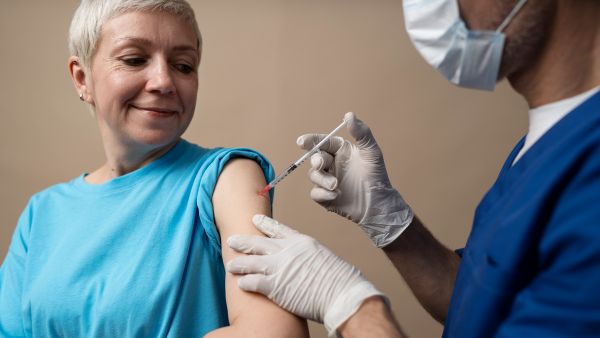Embarking on a transformative journey in the realm of healthcare, the National Health Service (NHS) of Britain is gearing up to lead the charge in revolutionizing cancer treatment on a global scale. With unwavering determination, the NHS is poised to introduce an extraordinary breakthrough: an injection therapy known by the name atezolizumab. This remarkable treatment holds the potential to redefine the landscape of cancer care, targeting a spectrum of cancer types including lung, breast, liver, and bladder. By taking this pioneering step, the NHS is not only extending a lifeline to hundreds of patients but also etching its name as a trailblazer in medical innovation and patient-centric care.
How will it work?
The seven-minute cancer treatment jab works by using a type of # drug called atezolizumab. This drug works by stimulating a patient's own immune system to attack cancer cells.
In traditional cancer treatments, chemotherapy drugs are used to kill cancer cells, but these drugs can also damage healthy tissue and cells, leading to side effects. The new seven-minute treatment injection, on the other hand, specifically targets cancer cells, while avoiding damage to healthy cells, thereby reducing the risk of side effects.
The injection is administered under the skin, rather than intravenously. This means that the treatment can be delivered quickly, and it can be given in an outpatient clinic, rather than in a hospital, which can reduce the stress and burden on patients.
The game changer in cancer care
Following approval from the Medicines and Healthcare Products Regulatory Agency (MHRA), NHS England has introduced an innovative seven-minute cancer treatment jab that has garnered considerable attention. Referred to as a "game-changer" in cancer care by NHS England, this treatment offers a remarkable reduction in treatment time, presenting a more convenient option for patients. By significantly shortening the duration of treatment, this breakthrough has the potential to revolutionize cancer care, allowing patients to receive their therapy and promptly return home in a matter of minutes rather than hours. The initial rollout of this treatment is targeted at specific cancer patients, particularly those with specific types of lung cancer. This approach ensures that individuals in need of this novel therapy can access it effectively. NHS hospitals and cancer clinics across England are expected to offer this treatment, making it accessible to a broad range of patients seeking efficient and effective cancer therapy. However, it's important to note that these statements are based on available information and might be subject to updates or changes as further research and implementation progress.
In conclusion, the UK's first 7-minute cancer treatment jab marks an exciting advancement in cancer care. With the approval from the Medicines and Healthcare Products Regulatory Agency (MHRA), this treatment offers a quicker, more targeted approach to fighting cancer cells. NHS England has hailed it as a game-changer and a significant development in cancer treatment. By reducing treatment time and offering a more convenient option for patients, this jab has the potential to revolutionize cancer care and improve outcomes for patients. As it is rolled out to specific cancer patients across England, it brings hope for a more effective and efficient approach to battling cancer.

 Britain's NHS leads with a pioneering seven-minute cancer treatment, cutting therapy time up to 75%. The injection, utilizing atezolizumab, promises substantial progress in cancer care, benefitting countless patients.
Britain's NHS leads with a pioneering seven-minute cancer treatment, cutting therapy time up to 75%. The injection, utilizing atezolizumab, promises substantial progress in cancer care, benefitting countless patients.









.jpeg)

.jpg)


















.jpg)